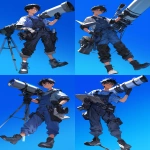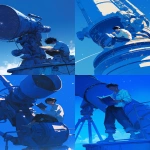Explore the Best AI Image Gallery

A New Lens: How AI is Transforming Product Photography
Product photography has always been a crucial aspect of e-commerce and marketing. High-quality images entice customers, showcase details, and ultimately drive sales. But the landscape is rapidly evolving, with artificial intelligence (AI) emerging as a powerful force reshaping how we capture and present products.
From automating tedious tasks to generating stunning visuals, AI is revolutionizing product photography in ways that were once unimaginable. This blog post delves into the multifaceted impact of AI on this creative industry, exploring its potential uses, ethical considerations, and future trends.
Streamlining Workflow with AI Automation
One of the most significant impacts of AI in product photography is automation. Repetitive tasks like image editing, background removal, and color correction can now be efficiently handled by AI-powered tools. This frees up photographers to focus on more creative aspects, such as composition, lighting, and storytelling.
AI algorithms can analyze images and automatically adjust brightness, contrast, sharpness, and other parameters to achieve optimal results. They can also seamlessly remove backgrounds, creating a clean and professional look for product shots. This automation not only saves time and effort but also ensures consistency across a large volume of images.
Enhancing Creativity with AI-Generated Content
Beyond automation, AI is pushing the boundaries of creativity in product photography. Generative AI models can create entirely new images based on textual prompts or existing photographs. This opens up exciting possibilities for designers and marketers to visualize unique concepts and experiment with different aesthetics.
Imagine generating a series of product photos showcasing your latest design in various settings, colors, or even fantastical environments. AI-powered tools can make this a reality, enabling brands to create engaging and imaginative content that captures the attention of consumers.
Ethical Considerations in AI Product Photography
While the potential benefits of AI in product photography are undeniable, its crucial to address the ethical considerations that arise with its use. One concern is the potential for job displacement as automation takes over certain tasks traditionally performed by human photographers.
Its important to ensure that AI is used as a tool to augment and enhance human creativity rather than replace it entirely. Training programs and reskilling initiatives can help photographers adapt to the changing industry landscape and leverage AI to their advantage.
Another ethical consideration is the potential for bias in AI algorithms. If the training data used to develop these models reflects existing societal biases, it can result in biased outputs that perpetuate harmful stereotypes or discrimination. Its essential to ensure that AI tools are developed and used responsibly, with a focus on fairness and inclusivity.
Future Trends in AI Product Photography
The future of product photography is undoubtedly intertwined with the continued evolution of AI. Here are some emerging trends that are shaping this dynamic field:
- Hyper-Personalization: AI can analyze customer data to create personalized product images that resonate with individual preferences.
- Interactive Photography: Consumers may soon be able to interact with product images, rotating them, zooming in on details, and even customizing their appearance using AI-powered tools.
- Augmented Reality (AR) Integration: AI can enhance AR experiences by generating realistic product visualizations that consumers can overlay onto their physical environments.
- Real-Time Image Editing: Imagine capturing a product shot and instantly applying AI-powered edits to achieve the desired look and feel.
These trends highlight the transformative potential of AI in product photography, pushing the boundaries of creativity, efficiency, and customer engagement.
Conclusion
AI is undeniably reshaping the landscape of product photography, bringing both exciting opportunities and ethical challenges. By embracing responsible innovation and fostering collaboration between humans and machines, we can harness the power of AI to create captivating visuals that elevate brands, enhance consumer experiences, and drive business success in the digital age.
](https://images.ai-img.art/thumbnails/150/fb17f777267d8f5ab1321703cbbaeda3a578d164f369735fe07899d0a3c7f39c.webp)









](https://images.ai-img.art/thumbnails/150/6e7c14b3d1c1d1294d6ce497cb648d3499121cebbeffbfced0daccaeeb7a4ffd.webp)






](https://images.ai-img.art/thumbnails/150/ffc604ea406b0a83a278328589577f8b7761d0063f4618ec6502794c116d21a2.webp)






](https://images.ai-img.art/thumbnails/150/ae1f022faddb1fa4e9990e3a6b422ca8ebc04a5f1023d5da1b491cf09f4c3a72.webp)


](https://images.ai-img.art/thumbnails/150/5db1b5c16845efa6b507cd5bd3beeebf64ee25f60cbec605c5db45589c05b3ec.webp)








](https://images.ai-img.art/thumbnails/150/261d17404aa924fc9c65c324dfe07ad049150d0d5bf2d17602555726e3e4cbaf.webp)






](https://images.ai-img.art/thumbnails/150/da63d2ce1bb9956da8f72ee5c1a22604a44aded9fd2883324716b0f11ac0cdfd.webp)


](https://images.ai-img.art/thumbnails/150/a7a08a01ca720b6946bdc5f019de05b39fd0cb008ff96117f5200907623bcdce.webp)


